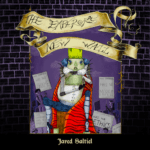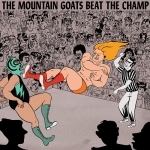The timely case of Michael A. Grant declaring “It’s Not Really The Apocalypse”

Image courtesy of artist
Writing an album that tackles evergreen topics, personality archetypes, or problems isn’t a new art. However, there’s something to be said for the cleverness of a self-contained score that covers a niche narrative, is almost a year old and yet – upon a first listen in late February 2020 – sounds like a musical commentary from an entirely relevant, present day-based point of view. This is what Manchester, England composer and multi-instrumentalist, Michael A. Grant, manages to do with his musical album, It’s Not Really The Apocalypse.
It’s unfortunate that the lasting pertinence of Grant’s record is also its most unsettling characteristic – to no fault of its own, of course. A musical score that is thorough in the telling of its imagined end-of-the-world storyline, “Apocalypse’s”15 tracks work together just as a musical score should but when pulled apart and heard independently, still provide fully fleshed out ideas more than capable of entertaining on their own.
“‘It’s Not Really the Apocalypse’ tells the story of four friends, who wake one day after the mother of all hangovers to discover they are the only humans left on the planet. Over the course of 14 songs they must adapt to their new lifestyle, whilst also overcoming a much greater challenge: learning to live with each other.” – Michael A. Grant
Beyond a strong affinity for the narrative-driven style of songs for musicals, Grant’s other appreciable creative decision with “Apocalypse,” is the flagrant dichotomy set between its unapologetically bleak subject matter and the cheerful disposition that steers the melody of nearly every song, regardless of their emotional intent or individual story developments. Even more impressive, of the numerous instruments, modern effects, and ambient sounds Grant could employ to create this deceptively lighthearted sonic atmosphere, two pianos are the sole instruments supporting the album’s vocal character cast of four: Gary (Dominic Lo); Lizzie (Carolina Garcia-Cox); Joe: (Edward Leigh); Helen (Emily Chesterton). The route that Grant takes to achieve “Apocalypse’s” uplifting mood leads to a few pleasant musical markers of late 19th and early 20th centuries: vaudeville, tin-pan alley, and ragtime music.
Carefully mixed to evoke the qualities of a couple worn-in, tone-loose, upright pianos, pianists Andrew Hopkins and Christopher Fossey play an assortment of musical themes emphasizing the syncopation and accent signature of the ragtime style. The descending arpeggiating hook at the beginning of “I Never Did Expect That It Would End Like This,” and the chromatically descending motif at the beginning of “Please Don’t Die” both elicit the kind of classic, downbeat-centric motifs heard in vaudeville theater and-or silent black and white film. Meanwhile, though retaining a similarly catchy rhythmic quality, other songs like “The Last Man Left on Earth” opt for momentum in counts of six, and in the case of “The Solitary Life,” an even more daring choice to write in the odd meter of 5/4. Despite all this structural diversity however, “Apocalypse”never loses a step in its musical cohesion.
There were oh so many ways that the
world could have gone,
From a global epidemic to a
hydrogen bomb,
But here is an option that was
never on my list,
For I did not expect that it would end like this!
– Lyrics from It’s Not Really The Apocalypse
Lyrically, it’s nearly impossible to deny the comical side of “Apocalypse.”While Grant is able to summarize each track’s scene with a rather plainspoken and unassuming statement, each of the song’s narratives seems to channel the kind of overly specific, and-or verbose, awkward humor of Monty Python. It’s not easy to write songs with a slew of words, have those words be multiple syllables, and-or have them represent complex definitions, while still coming out the other side of things with a fluid piece of music with which it’s surprisingly easy to sing along. At the same time, with generalized verses like the one above, the vagueness of the refrain gives the music a solid feeling of satire. (Think “Diva’s Lament (What Every Happened To My Part?)” from the satirical take on musicals heard in Monty Python’s Spamalot.)
It’s Not Really the Apocalypse isn’t exactly the kind of album that works well for everyday recreational listening, for no other reason than in even with satirical context, thinking about the end of the world on a regular basis isn’t good for one’s mental health. Still, for all the positive and amusing sarcasm it offers, in moderation, “Apocalypse”can certainly fill the role of a stress reliever for the ominous topics it explores. And compositionally, it can serve well as a model of a focused musical score.
Find It’s Not Really The Apocalypse on Bandcamp.
Keep up with Michael A. Grant’s work through his official website.




Leave a Reply